Sherlock Holmes and the Seven Deadly Sins Murders Read online
Page 3
“Surely, Holmes, removing it represents tampering with evidence at the scene of a crime?”
“You are quite right, of course, Watson, but the solution of this particular crime is not to be found in the hills and glens of Bonnie Scotland. Before I left, I advised the good Sergeant Drummond to bring in Scotland Yard on the grounds that Briggs was merely a visiting Sassenach and whose history lay firmly south of the border. He breathed a sigh of relief and said he was of the same mind exactly. At this very moment it may cheer your soul to think that Lestrade’s minions are even now heading to the place we have just left.”
“So I take it you don’t believe these were a gang of local thieves and that things somehow got out of hand?”
“Oh, yes, I certainly believe things got out of hand. The original group were clearly looking for a specific something that they did not find. Then one of them returned with his own separate and personal agenda, which—as you saw—he carried out most efficiently …”
“To kill Sir Simon?”
“To kill Sir Simon—or Mr. ‘A’, as we may call him. Not merely kill him—deface him.” And he held the photo up to the early morning light coming through the carriage window.
“The question we have to ask ourselves is—why? And the answer to that, I venture to suggest, Watson, lies in the identity and location of Messrs. ‘G’, ‘L’, ‘P’, ‘R’, and ‘E’.”
“And precisely how do you propose to determine that?” I asked. “If Briggs is indeed ‘A’—which I am perfectly prepared to admit—how does that help us? That photograph was certainly taken many years ago.”
“It helps us because it speaks to us, old fellow. Not through the dramatis personae but through the location. That photograph was taken in the main quadrangle of Christ Church College, Oxford—a place I know well from the days when my brother Mycroft was an undergraduate there. I have little doubt but that he may be able to throw a ray of light that will enable us to move a step or two further. When we have removed the dust of travel from our persons, I propose that we pay him a visit and see what we can discover about these alphabetical gentlemen.”
“And you believe that will lead us to Briggs’s attackers?”
“Oh, I hardly think we shall have too much trouble locating them. You see, we have already seen them.”
“What do you mean—seen them?”
At this Holmes reached into an inside pocket and extracted an envelope. From it he shook a couple of bright green threads on to the palm of his hand.
“Briggs’s visitors—one of them his attacker—were undoubtedly the group dining at the inn with us last night. There can be few people in that part of the world who were wearing emerald green silk last night. I recovered these fibres from the window frame while you were examining the body. But even without their corroboration, surely you noticed the hint of the lady’s perfume in the room? Even the chloroform could not entirely obscure it …”
“And they had the infernal audacity to murder a man and then sit down to dinner!”
“I don’t think they did murder him. I believe they paid their visit, found it to be fruitless and left Briggs—as they thought—subdued but unharmed. It was another of their party—almost certainly that late arrival at dinner—who doubled back and finished the job. Unless the lady and her companion were actors of the first order, they were genuinely disturbed by what he had to tell them and I would wager that was an expurgated version of the facts as we now know them.
“Whatever his relationship with them, he has achieved one other result …”
“And that is?”
“He has grappled them to his soul with hoops of steel, as Shakespeare would have it. Your lady friend may have originally committed the comparatively minor crime of being an accessory to breaking and entering but now she is involved up to her elegant ears in murder.”
And with that, he tucked the photograph securely into his luggage, pulled his hat down over his eyes and said not a word until the train reached King’s Cross.
Holmes has the knack of summoning up sleep at will. He can catnap anywhere and wake up completely refreshed. It’s a knack I have never been able to master and, consequently, when we reached Baker Street, I would have welcomed forty winks but my contradictory friend—in contrast to his Highland lethargy—was now full of energy.
“Come along, Watson. Here we have the first case that promises to be of the slightest interest to cross our path in months and you want to sleep. I do believe, if you had your way, you would condemn me to the pursuit of schoolgirls’ lost pencil cases, so that you could put your feet up!”
I could have pointed out that a year that had involved the man in cases—quite apart from the Apocalypse business—as diverse as the sudden death of Cardinal Tosca, an inquiry he carried out at the express desire of His Holiness the Pope, and the affair of Wilson, the notorious canary trainer, which, it was generally agreed, had removed a plague spot from the East End of London, could hardly qualify as dull. But when Holmes was in this mood, there was no arguing with him. So I did not tempt providence.
Then he did say something that sparked my attention.
“Surely you want to find your Woman in Green again?”
And I had to admit to myself that, in fact, I did.
He was generous enough to permit us a cup of tea before we set off to seek Mycroft at his habitual lair, the Diogenes Club and I was just settling in my chair with mine when the door bell rang down below and I heard Mrs. Hudson admit someone. A tread on the fourteen steps that I had learned to recognise over the years, a familiar tap on the door and the equally familiar face of Inspector Lestrade of Scotland Yard peered round it.
“Well met, Lestrade. Just the man I wanted to see,” cried Holmes, slipping on his jacket as he entered the room from his bedroom. “What news from the north?”
“And good day to you, too, Mr. Holmes—Doctor,” Lestrade replied, too seasoned a campaigner to be rushed. “Why, thank you, Doctor, I will have a cup, if you’re pouring.” And he took the proffered cup, which had been intended for Holmes, who gave me a glance that told me he had read the unspoken message.
“Very well, Watson, a place for everything and everything in its place. You may well be right.” And he sank into his usual chair with good grace.
How often had the three of us sat here like this, I reflected, while events grave and gay, some of them affecting the highest in the land, were unfolding around us. How often had the decisions we had arrived at in this room changed the lives of hundreds, even though they were never to be aware of it?
We were an ill-assorted trio. Holmes, thin and angular, perched in his chair at a moment like this, as if ready to take flight. Lestrade, small, almost—if I’m honest—ferrety but as tenacious as any of that under-rated species when he had determined his target. And me—how did I view myself? A middle-aged ex-soldier of no particular distinction with a war wound that played up in the damp weather. And yet that remarkable man, Holmes had told me on more than one occasion that I completed him—so who was I to argue. Certainly the three of us had survived more than a few adventures together and it seemed as though we were about to embark upon another.
“News from the north, eh?” Lestrade said at length, carefully putting down his cup and saucer on the floor beside his equally carefully-folded topcoat. He then took a piece of paper from an inside pocket.
“I received this cable from my men up there just before I came out.” He smoothed it flat and began to peruse it. “They essentially confirm your analysis of the situation, Mr. ’Olmes …” He scanned the document for the key points.
“A dark complexioned gentleman, giving what I’m pretty sure will turn out to be a false name, rented a house in the vicinity … seen there with a foreign woman described as being “very striking” … A gross understatement, I found myself thinking. “Joined yesterday by another man nobody could describe too well. All of them skedaddled in the middle of the night … Oh, everything paid up. In fact, it was because t
hey paid well over the odds in advance and no questions asked to rent the place that the locals paid so much attention to them.
“No sign of them on the train, so they must have had their own transport ready and waiting.”
“Yes, yes, Lestrade,” Holmes interrupted testily, “but what about the scene of the crime?”
“Very much as you said,” the Inspector replied, not to be hurried in his account as he consulted the telegram. “The controls of that there vault were properly seen to. There was no way that poor devil could have got out, short of using dynamite …”
“Which would have blown him to Kingdom Come, anyway,” I added helpfully.
“Just so, Doctor,” said Lestrade, returning like for like. “Even supposing he’d happened to have any dynamite with him. The locals have got search parties out in the area but, frankly, gentlemen …”
“The birds have undoubtedly flown, where even Watson’s friends, armed to the teeth as they are, could not reach them.”
“Just so, Mr. ’Olmes,” said the Inspector, clearly puzzled by the reference.
“There is just one other small matter, Lestrade,” said Holmes, producing the framed photograph, which had been lying face down on the table next to his chair.
He then proceeded to explain the circumstances in which he found it.
Lestrade gave him a glance that would have rooted most men to the spot but somehow it also managed to convey that he knew it was pointless to debate the issue.
“So you believe this piece of evidence suggests that one or more of these other men in this here picture may have something to do with the death of Sir Simon?”
“I believe it is an assumption we must explore, Lestrade, if only to eliminate it. Sir Simon does not appear to have been exactly a modest man and there were various likenesses of him around the room, not least the life-size portrait over the fireplace, and yet in conjunction with the fact that it is the only one in which he is seen wearing the initial letter that was painted on his body—and I think the odds narrow considerably.
“Furthermore, Lestrade, if I were a betting man, I would be prepared to wager that we have a sporting chance of shortening them still further, if we consult the Oracle forthwith …”
In answer to Lestrade’s puzzled frown, I added—“Brother Mycroft.”
Holmes consulted his watch. “And by my calculation we have precisely one hour before he goes in to dinner, a ritual that is totally sacrosanct. I presume you have retained your official carriage, Lestrade …?”
The Diogenes Club is unobtrusively situated in Pall Mall and for greater convenience Mycroft has rooms just opposite. Its ability to melt into the background is one of the attributes its members value most highly.
They have one other attribute in common. None of them wishes to have communication with his fellow members. The ‘No Talking’ rule is so strictly enforced that to break it is to risk summary expulsion from an institution that has gained a reputation for having as its members the most unsociable and unclubable men in town. I remember Holmes once telling me that his brother had been one of the founding members and largely responsible for drawing up its code of conduct. I had found it an unsettling experience on the one previous occasion I had had cause to visit its dingy premises. To the best of my knowledge, Lestrade had never been within its portals and I looked forward to watching his reaction.
I cannot honestly say that Mycroft Holmes looked pleased to see our little delegation. When the porter, who bore a distinct resemblance to an undertaker in both dress and demeanour, had winkled him out of the recesses of the club, his first reaction was to check his fob watch before even a word of greeting had been exchanged.
“Do not concern yourself, brother mine, our mission is brief,” said Holmes and that seemed to cheer the elder brother enough to merit a wintry smile and a flaccid shake of the hand for Lestrade and myself.
“I believe the Strangers’ Room is free.” It was more of a statement than a question for the porter, who nodded. “It is the only room in the club where talking is allowed,” Mycroft continued rather smugly, as he led the way down a dimly-lit corridor into the bowels of the building.
Then, as if almost apologising for his lack of courtesy, he turned his bland mandarin face towards Lestrade. “You must forgive our byzantine little ways, Inspector. A few like-minded souls find the clamour of modern life too much for our delicate constitutions. My brother and the good doctor have learned to indulge me. I hope you will, too.”
In truth, I had only seen Mycroft a handful of times in the years I had known Holmes and our relationship was affable without being what one would call close. I suppose, if I’m honest in the matter, my nose had been somewhat put out of joint when he had been the one Holmes had entrusted with the secret of his survival after the Reichenbach incident, leaving me to grieve all those months over what I assumed was his death. Having said that, I perfectly understood and had long since accepted my friend’s motives.
To say that Mycroft Holmes was a large man was a considerable understatement. He was built on a gargantuan scale. Holmes was tall—an inch or two over six feet—and his lean frame made him seem even taller but his elder brother, though perhaps only an inch or so more in height, gave the impression of being absolutely massive. The face was large and, although it was not obvious at first glance, closer inspection revealed certain similarities. There was the same sharpness of expression on the rare occasions that his attention was engaged and the eyes—a peculiarly light, watery grey—had in their depths that distant, introspective look I had encountered in only one other man and that was Sherlock Holmes when he was exerting his full powers.
This was the formidable man who was now ushering us, like some maiden aunt, into a rather shabby little room that completely deserved the title lettered over the door—STRANGERS’ ROOM.
As he closed the door behind us, Mycroft spoke in a normal tone for the first time since we had entered the cloister he called a club. Looking ostentatiously at his watch again, he said briskly—“I can give you just seventeen minutes. For you to burst in at this time of day, I can only assume there is some matter which you believe to be of some small import?”
And a corner of one eyebrow was raised interrogatively some quarter of an inch from the perpendicular.
All of which was wasted on Holmes, who had played this game before. Taking the photograph from his pocket, he thrust it into his brother’s hand.
“My dear Mycroft, I was merely wondering what you could tell us about this …”
Mycroft adjusted a pair of pince-nez and held the photo up to the light.
At which point the universe imploded. Or rather, to be exact, Mycroft’s eyebrow shot up a further quarter inch. Then, very carefully, he laid it down on the room’s central table.
“Wait here,” he said in a tone so different from his normal one that I felt a chill tiptoe up my spine. And then the door closed softly behind him.
For the next few minutes none of us exchanged a word. There seemed to be nothing to say. The only one to move was Holmes, who looked once more at the photograph without picking it up and then began to drum his fingers on it. I found myself concentrating on the rhythm to see if it had any specific meaning but, as far as I could tell, it did not.
“I believe the expression is—‘Snap!’”
Somehow Mycroft had re-entered the room without our hearing and I was reminded how light on his feet he could be for such a large man.
Now he laid something down side by side with the photograph.
It was an identical copy—except that this time the image of Sir Simon Briggs was untouched. This time another figure had been literally ‘de-faced’. This one wore a sweater with the capital letter ‘P’.
As three heads bent as one over the twin images, I heard Mycroft say—“Briggs, too?”
Holmes straightened up.
“And ‘P’?”
“I’m afraid so. Victor Ian Pelham—known to his friends as V.I.P., which always pleas
ed him greatly, since he had ambitions in that direction. To be accurate, I should say Victor Pelham, M.P. A rising figure in the Liberal Party. Many of his colleagues felt he might well fill Gladstone’s shoes one of these days but that, alas, we shall now never know.”
He answered his brother’s questioning glance.
“Victor Pelham died this afternoon on the floor of the House of Commons. He appears to have been poisoned.”
As Mycroft began speaking, we had all found ourselves chairs around the table and now we sat there like guests at a séance.
It was Lestrade who reacted first.
“So that must have been all that kerfuffle that was going on as I was leaving for Baker Street. I heard something about the House of Commons but I thought it must be one of those demonstrations they’re always having there these days.”
“But before I get into that—what about this?” And Mycroft picked up the ‘A’ photograph between his finger and thumb, as though he thought it might well be contaminated.
For the next few minutes Holmes and I described what had happened up in Scotland. By the time we had finished—with the occasional “Lumme” or “Strike me!” interruption from Lestrade and total inscrutable silence on the part of Mycroft—the room was beginning to grow dark.
Mycroft did not even bother to consult his watch but simply rang for a steward and ordered a welcome round of whisky and soda. When it had been brought and we were once again alone, he appeared to have come to a conclusion.
“Well, gentlemen, since we appear to have arrived at the same point in the maze, albeit by differing routes, it would seem sensible to compare notes.
“I was apprised of this late this afternoon”—and he picked up the Pelham photo—“in my governmental capacity …”
Exactly what that ‘capacity’ was I was never to learn. Suffice it to say that there was little that went on in Her Majesty’s Government in which Mycroft Holmes was not involved to one degree or another. Whatever strings were pulled, they seemed to end up in his hands. I remember Holmes once telling me with distinct admiration in his voice that “occasionally he is the British Government … again and again his word has decided the national policy.”

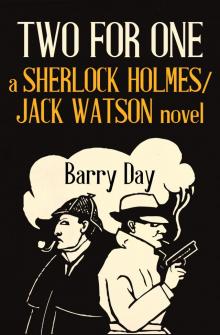 Two for One
Two for One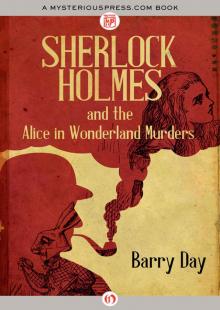 Sherlock Holmes and the Alice in Wonderland Murders
Sherlock Holmes and the Alice in Wonderland Murders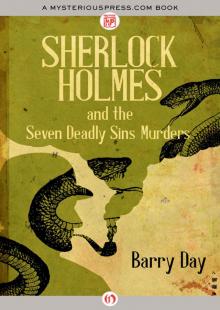 Sherlock Holmes and the Seven Deadly Sins Murders
Sherlock Holmes and the Seven Deadly Sins Murders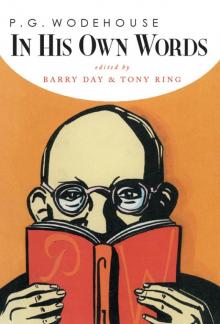 P.G. Wodehouse in his Own Words
P.G. Wodehouse in his Own Words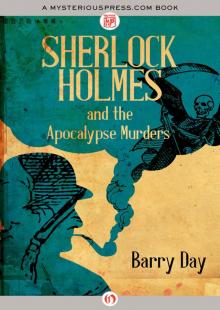 Sherlock Holmes and the Apocalypse Murders
Sherlock Holmes and the Apocalypse Murders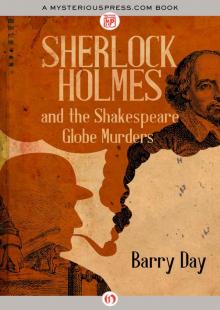 Sherlock Holmes and the Shakespeare Globe Murders
Sherlock Holmes and the Shakespeare Globe Murders